America’s eyecare pros spend a lot of time on their phones. According to a recent INVISION Brain Squad survey, more than one-third of store owners pick up their phones more than 50 times a day. It’s often the first thing they see when they wake up and usually the last thing they glance at before falling asleep. In between, they spend something like five hours absorbed in its glow.
Of course, there’s not much about this experience that is unique to ECPs. In 2021, it’s how modern life is lived. Apart from the occasional long-haul flight, camping trip, or natural disaster that brings down the grid, we are online and connected 24/7, catching up on news, infection rates, customer issues, our stock portfolio, the current location of the burrito we ordered, and the latest zinger from our favorite political pundit.
The initial promise of an always-on, interconnected world was that it would be professionally enabling, personally enriching and socially democratizing as it brought a world of ideas and useful data (not to mention peer-reviewed products) to wherever you were. But the reality has been darker. The internet, and social media in particular, has been blamed for stoking our baser instincts — the constant overwhelming access makes us feel jealous or inadequate, exhausts us, fuels rage, robs us of time we could spend with our loved ones or on important tasks, and has given rise to concerns about social dysfunction.
We are constantly told that life these days moves too fast, bombarding us with too much information, that our brains are being hijacked and remolded. We read that teenagers are on the “brink of the worst mental-health crisis in decades.” We face a “coming dark age,” cautions Maggie Jackson in Distracted. She fears an “attention-deficit future” in which we’ll live shallow, joyless lives, stripped of our powers of “deep focus.”
Much of this is overblown and is clearly hyperbole (it’s no small irony that in the information age, everything must pretty well be the worst crisis ever just to get our attention). But it’s also undeniable that we could all use the technology better. “I am part of the problem,” laments Ann-Marie Weaver, owner of Optimal Eye Care, in Lewis Center, OH. “I find myself lost in my phone more often than I would like. My goal every day is to spend less and less time caught up in the social media blah of the world and to focus on the present.”
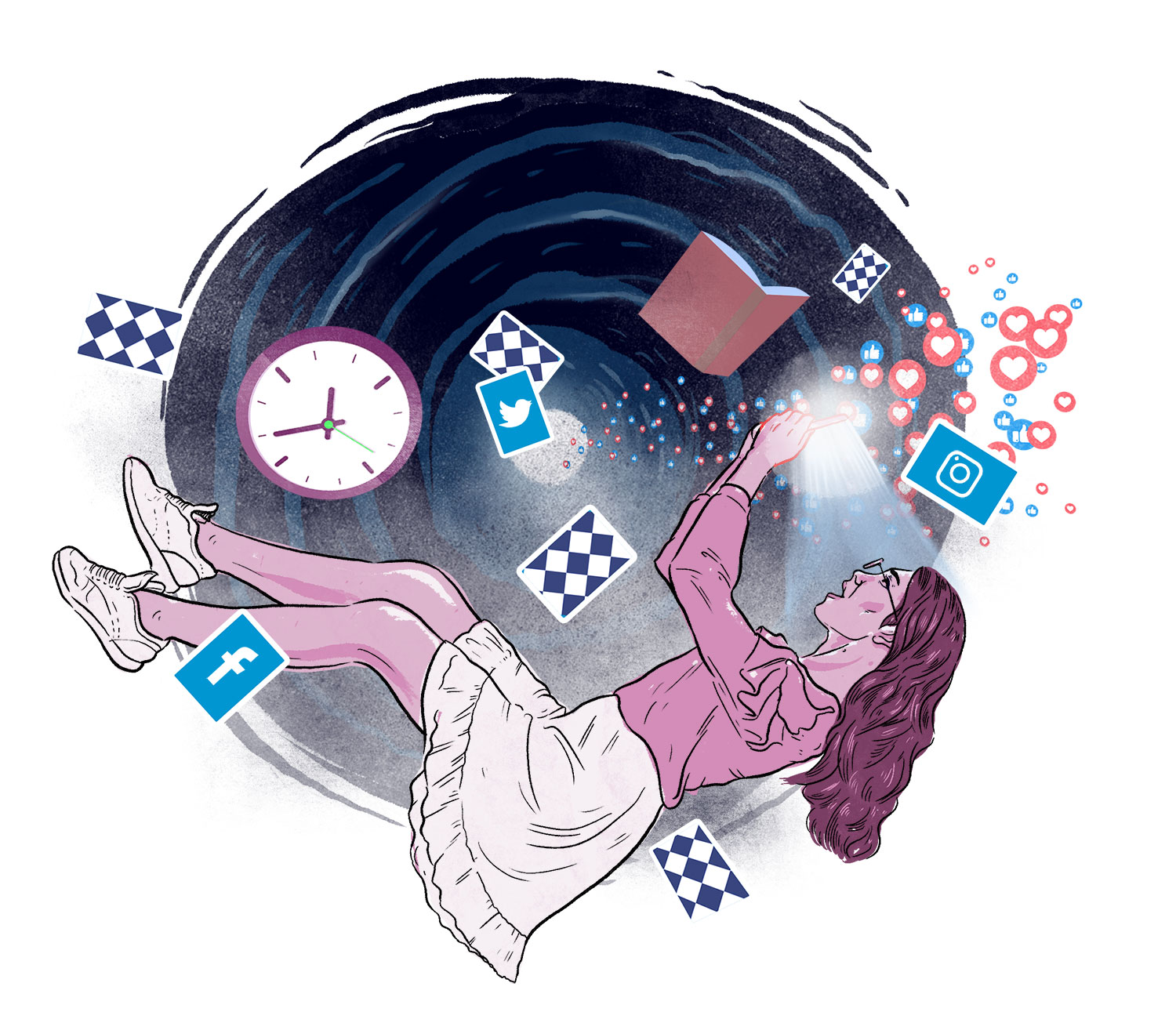
America’s eyecare pros spend a lot of time on their phones. According to a recent INVISION Brain Squad survey, more than one-third of store owners pick up their phones more than 50 times a day. It’s often the first thing they see when they wake up and usually the last thing they glance at before falling asleep. In between, they spend something like five hours absorbed in its glow.
Of course, there’s not much about this experience that is unique to ECPs. In 2021, it’s how modern life is lived. Apart from the occasional long-haul flight, camping trip, or natural disaster that brings down the grid, we are online and connected 24/7, catching up on news, infection rates, customer issues, our stock portfolio, the current location of the burrito we ordered, and the latest zinger from our favorite political pundit.
The initial promise of an always-on, interconnected world was that it would be professionally enabling, personally enriching and socially democratizing as it brought a world of ideas and useful data (not to mention peer-reviewed products) to wherever you were. But the reality has been darker. The internet, and social media in particular, has been blamed for stoking our baser instincts — the constant overwhelming access makes us feel jealous or inadequate, exhausts us, fuels rage, robs us of time we could spend with our loved ones or on important tasks, and has given rise to concerns about social dysfunction.
We are constantly told that life these days moves too fast, bombarding us with too much information, that our brains are being hijacked and remolded. We read that teenagers are on the “brink of the worst mental-health crisis in decades.” We face a “coming dark age,” cautions Maggie Jackson in Distracted. She fears an “attention-deficit future” in which we’ll live shallow, joyless lives, stripped of our powers of “deep focus.”
Advertisement
Much of this is overblown and is clearly hyperbole (it’s no small irony that in the information age, everything must pretty well be the worst crisis ever just to get our attention). But it’s also undeniable that we could all use the technology better. “I am part of the problem,” laments Ann-Marie Weaver, owner of Optimal Eye Care, in Lewis Center, OH. “I find myself lost in my phone more often than I would like. My goal every day is to spend less and less time caught up in the social media blah of the world and to focus on the present.
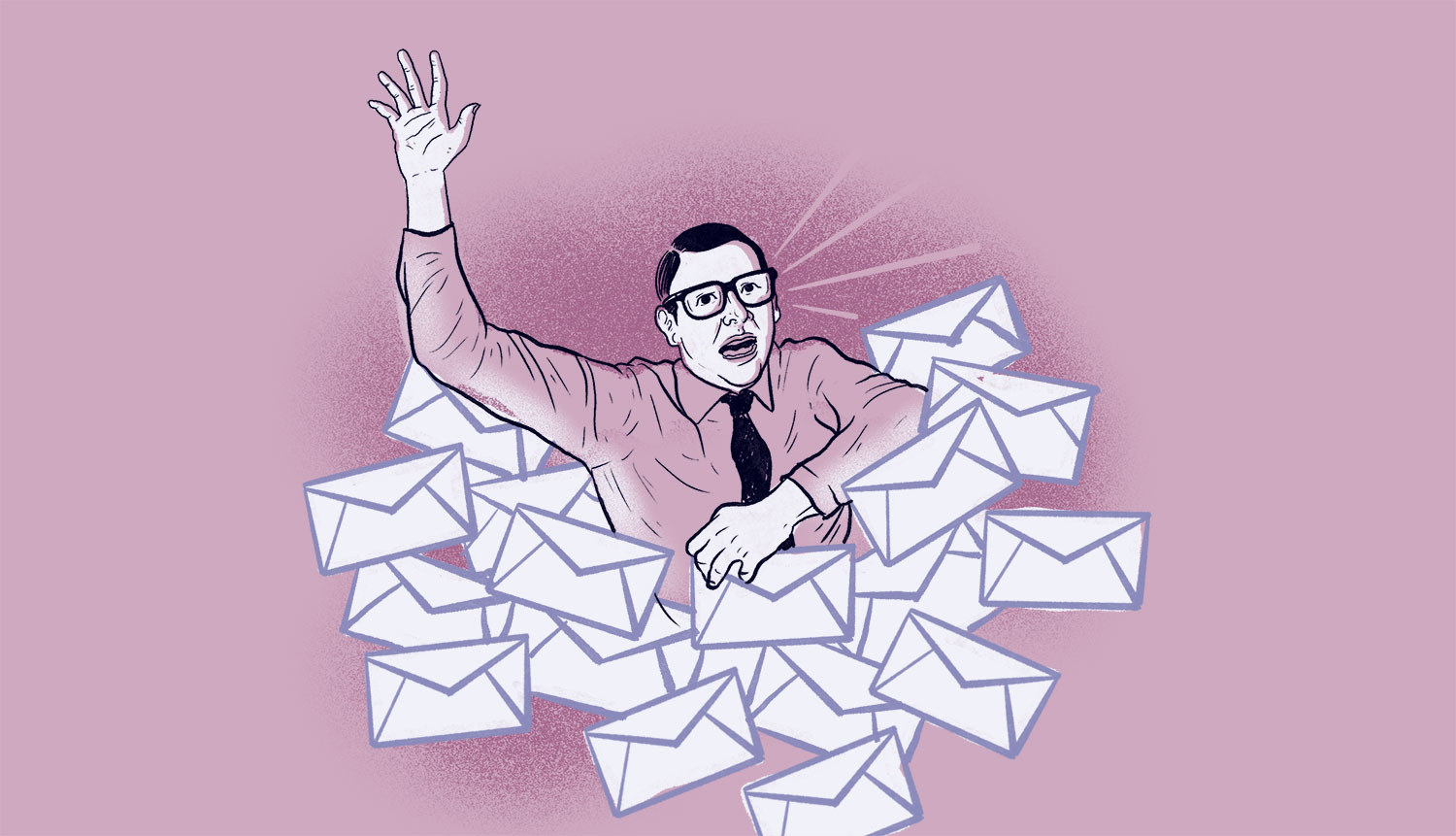
1. SET LIMITS
Set new expectations for email responsiveness. Feel like you’re drowning in email traffic? Use the start of 2021 as an opportunity to set a new status quo for email communication. Edelman, a global public relations firm based in Toronto, has a 7-to-7 rule that discourages employees from sending email messages before 7 a.m. or after 7 p.m. In a lot of these matters of communication and engagement, you have more choice than you believe — maybe you don’t need to be available on your days off.
2. Inventory Your Tech Use
Take an inventory of your tech use and evaluate each item for its usefulness, working on the assumption that if something can’t justify itself from a professional or personal angle, it’s out. Exit the social networks you barely use and get rid of the apps that, when you think about it, have no benefit. Yep, that means Candy Crush may have to go.
3. Go Minimalist
Cal Newport, one of the leaders of the digital minimalism school of tech use, recommends a more aggressive approach: completely unplug for a period of time to give your brain and emotions a breather so that you can reassess your digital needs. In Digital Minimalism: Choosing A Focused Life In A Noisy World, he advocates a month-long digital detox — a period in which a person takes a complete break from all optional technologies. When it’s over, the idea is that you slowly reintroduce these technologies on your own terms. “You don’t go back to what you did before. You rebuild it from scratch, but with intention,” Newport writes. The key is to ensure that “all the tech you have is amplifying something that you really care about.” For Tiffany Firer of Lifetime Eyecare in Jenison, MI, that meant cats, food, work and friends: “I have unfollowed all stressful things or separated them into different accounts. For example: on Instagram I have a food page where I only post and follow other food accounts. Then I have an account for my cats that only follows other cute animals, and my work one that I manage and I follow all industry-related pages, and finally my personal page where I follow mostly people I know in real life, meme pages that make me laugh, and absolutely nothing political. It’s kind of the perfect set-up for me; too bad Facebook isn’t as easy to compartmentalize.”
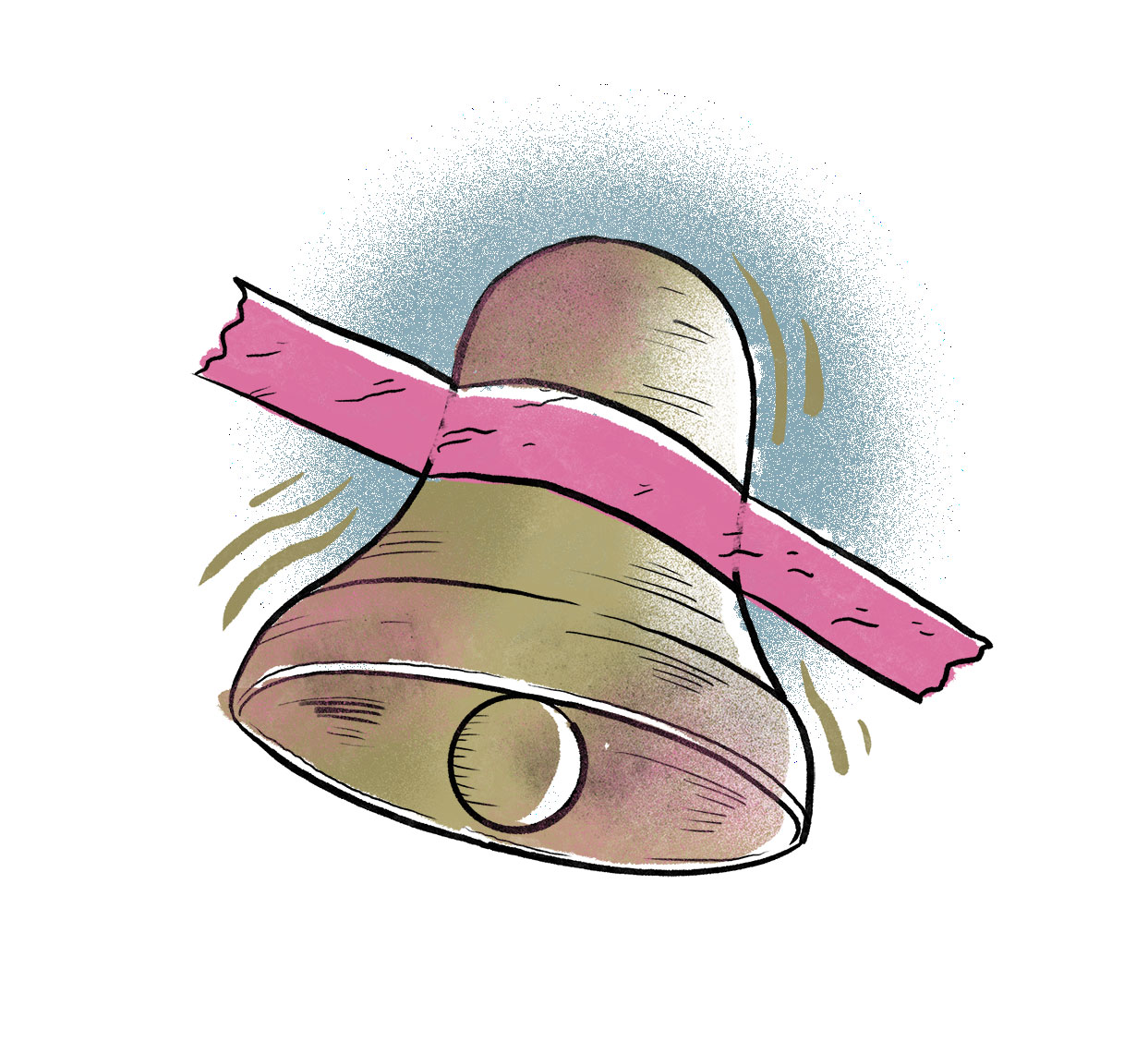
4. Control the Cues
To live with frequent notifications is to outsource decisions about how your attention is deployed to a motley collection of friends, colleagues and strangers, most of whom have no incentive to put your interests first: they want an answer to their email right now or more engagement for their app. Turn off your alerts — all buzzes, banners, pop-ups and French horn-playing ring tones. Next, identify what triggers you to grab the phone. Is it your first spoonful of cereal in the morning or setting the alarm before you go to bed (leading to one last quick dip into Facebook that ends an hour later with you fully updated on the lives of old schoolfriends’ children)? For Frances Ann Layton of Eye Associates of South Georgia in Valdosta, GA, it’s keeping her hands busy that is key. “It’s when I’m bored that out comes the phone and I lose hours scrolling,” she says. When you sit down to do important work at your desk, switch your phone to flight mode. Then set a time to check incoming streams of information, especially email, on your schedule. Even if that’s every 10 minutes, which it shouldn’t be, you’ll still be reclaiming some power. Dr. Adam Ramsey of Socialite Vision in Palm Beach Gardens, FL, puts his phone on Do Not Disturb mode “for half the day to reduce the alerts and notifications which allows me to concentrate.”
5. Out of Sight
Studies have shown even the presence of a mobile phone on a dinner table is enough to disrupt/degrade a conversation as the gaze of both parties turns repeatedly to the device. Truly being with a colleague or customer means picking up countless tiny signals from the eyes and voice and body language and context, and reacting, often unconsciously, to every nuance. What applies to a dining room applies doubly to the sales floor, staff meeting room, or home. “I leave my phone in another room when it is family time so that I am not tempted to constantly check it,” says Sarah Bureau of sbspecs in St. Catharines, ON.
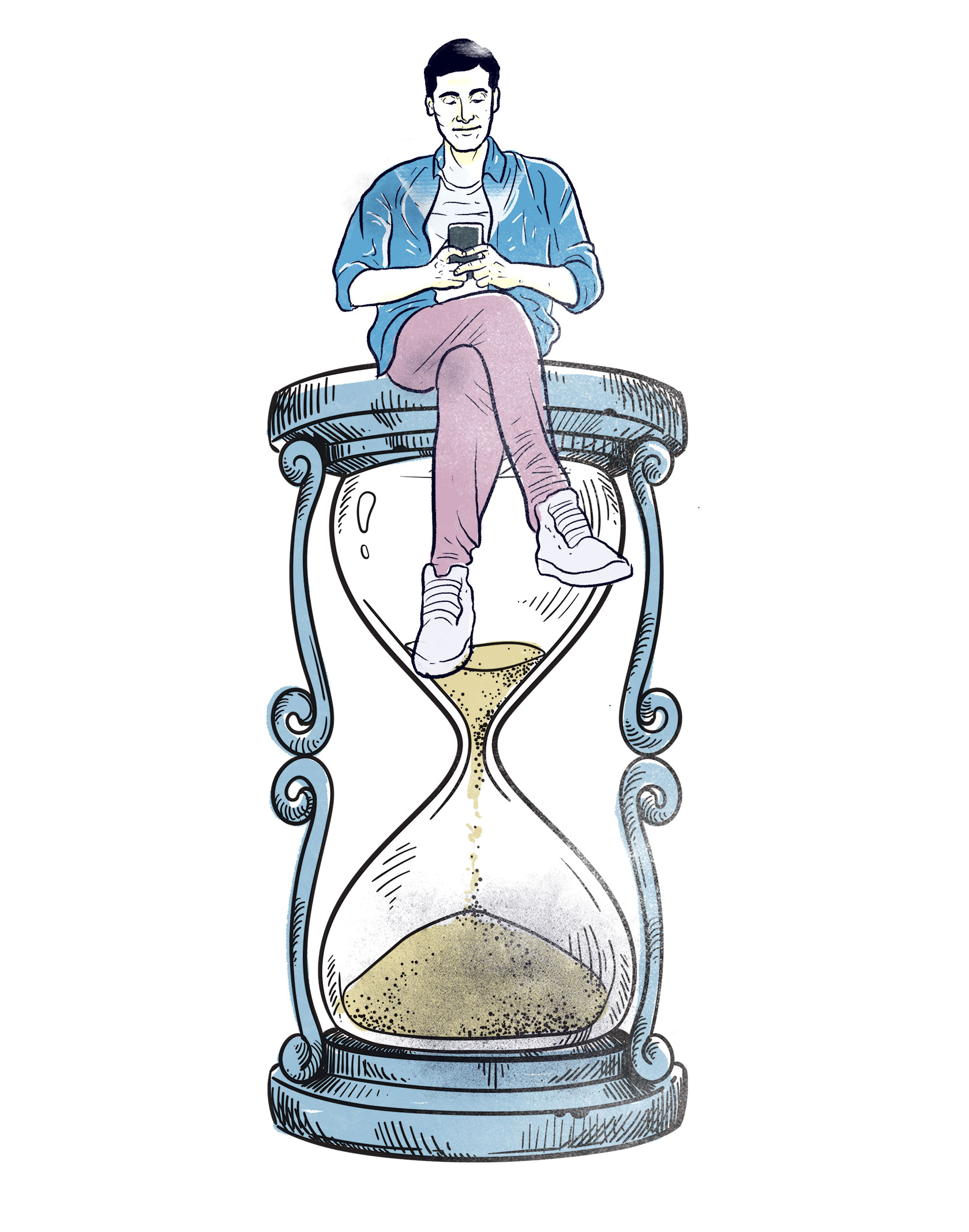
6. Time Yourself
First up, recognize your dependency. Once you know how much time you’re spending on your phone it’s easier to make bigger changes (e.g. spending entire days or weekends screen-free) but many people underestimate exactly how often and for how long they get distracted (again, it has to do with evolutionary inspired urges that made vital pursuits pleasurable: originally eating and sex, but that’s now become flicking through Twitter). To get an accounting, simply swipe to the left-most screen on your iPhone or tap “Digital Wellbeing” under an Android phone’s Settings to see how your use is trending.
7. Create Friction or ‘Sludge’
Triumphs of will power are surprisingly rare in everyday human situations. The central force for eliminating bad habits such as excessive phone use, according to social psychologist Wendy Wood, is “friction” — if we can make bad habits more inconvenient, then inertia can carry us the rest of the way. And the more hassle, the more success, she says in Good Habits, Bad Habits. Thus, turning the phone off completely is much more effective than silencing it, not because you become any less curious about who might have sent a text but because powering up is a drag. Delete apps. (If it’s important, you can always check through the browser). Jen Heller of Pend Oreille Vision Care in Sandpoint, ID, uninstalled Facebook and Messenger from her phone and expects Instagram to go next. “I also reset my passwords so they contain motivational phrases, and I don’t allow myself to stay logged in on any device. That way, every time I want to use a platform, I have to log in and type out a long phrase that reminds me to put down the keyboard and walk away, unless I absolutely have to!”
8. Out of House, Out of Mind
When you can’t trust yourself to not get sucked in, or just find the time requirements of social media too onerous, consider outsourcing the task to a media management service or to someone on staff. That works for BJ Chambers of Carrera Optical in McQueeney, TX: “I don’t participate in social media. I have people for that.”
Advertisement
9. Use ‘Calm Tech’
There are numerous programs that promise to combat electronic distraction: examples include Freedom, which temporarily cuts internet access; Anti-Social, which locks down Facebook and Twitter; StayFocusd, an extension for the Chrome browser that turns off Twitter after 45 minutes of daily use. Meanwhile, single-task devices like the Kindle ensure your attention doesn’t get diluted. Instapaper allows you to read articles later (offline if you want), confident you won’t miss out on anything. Ditto is a large button that clips to your belt or blouse and vibrates when you get a text or call from designated people in your address book. Yes, it’s a reinvented pager. But it allows you to stash your phone in your bag, out of sight and reach, but giving you reassurance you’ll be contactable for, say, an emergency involving a VIP customer. Jenna Gilbertson of McCulley Optix Gallery in Fargo, ND, recommends taking advantage of the controls in Digital Wellbeing if you have an Android phone. “I just set limits for my social media time and I already feel better!” she says. Other ECPs recommended services like Planoly, which allows you to schedule posts months ahead “and only reply to engagements and inquiries that come through it.”
10. Or Use Old Tech
They are getting harder to find, but a phone that does nothing but make calls ensures you won’t be led astray by the digital off-ramps of a smartphone. Similarly, get a cheap alarm clock and move your charger outside the bedroom. Deb Jaeger of Eye Center of the Dakotas in Bismarck, ND, says she can operate quite well without a personal presence on Facebook, Instagram or Twitter. “If you want to really know how someone is doing, or what they think about an issue, call them and have a good old-fashioned conversation,” she says.
11. All News is Not Good News
As a civic-minded citizen you have a responsibility to keep up with what’s going on, but technology can pretty much bring every, single thing that is happening on the planet to you and it’s easy to feel overwhelmed. Carefully prune incoming information streams, balancing the importance of staying informed against the need to push back a tide of negativity (usually) that has no real benefit. In particular, go easy on politics. While getting enraged about an issue may feel like you’re getting involved in something significant, in most cases you ultimately do nothing more than share a comment or hit a Like button. Anger is also addicting — something social media operators know all too well. There’s also the risk of getting offside with customers if you let your political stripes show. Jade Kowalick of Ryczek Eye in St. Petersburg , FL, says she has learned to “close out the second I see anything about politics. It’s so frustrating and ripping friendships apart, let alone the rest of the country.”
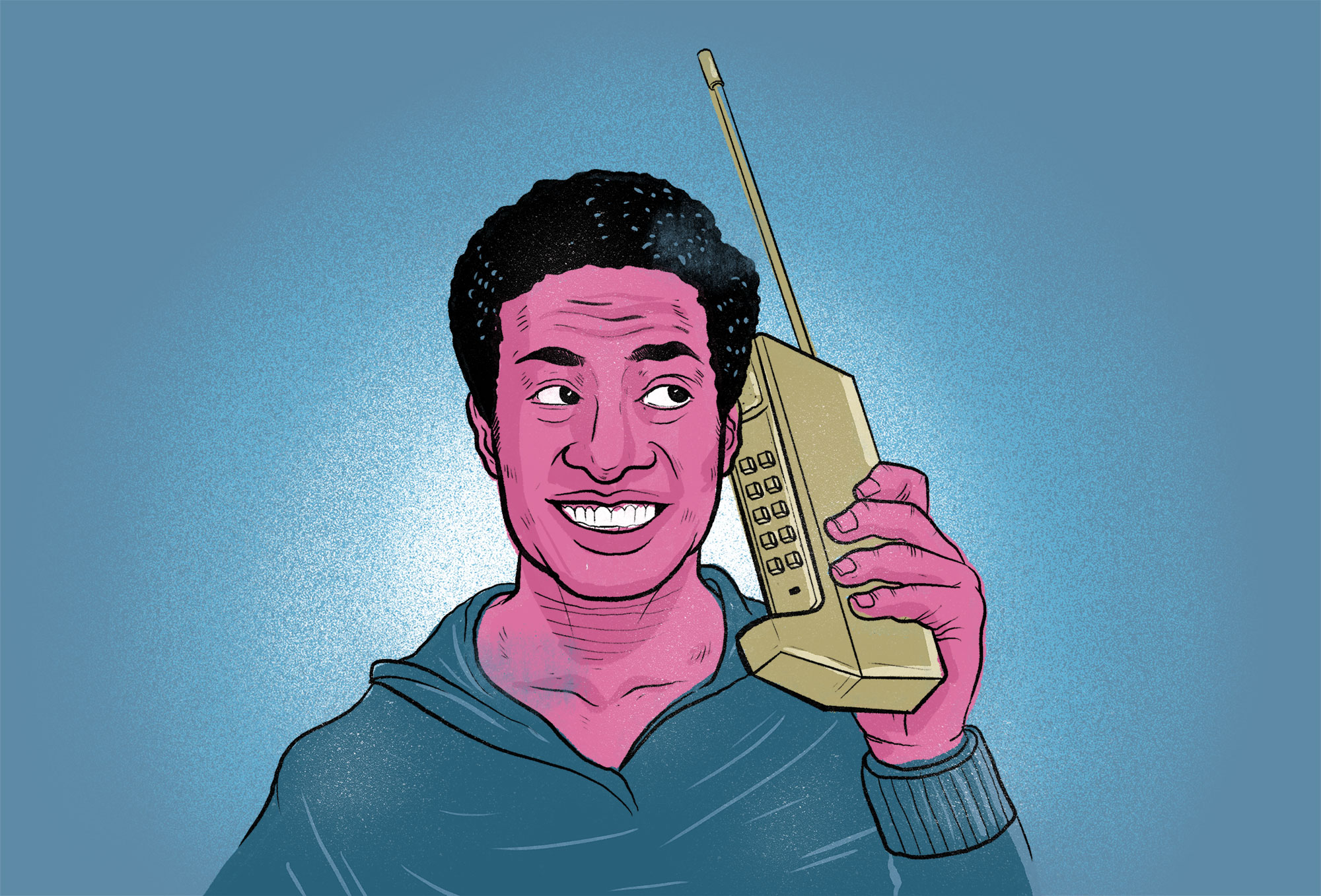
12. Ohmmmm…
Meditate. Everyone and their dog is doing it (literally, “pet and parent meditation” is a thing). Your brain needs downtime, silence, a chance to be with your thoughts. Meditation teaches you to focus the mind without outside stimulation, strengthening self-awareness so you retain the capacity to choose, say, when to go online and when to disconnect. Don’t have time? Try five minutes a day. You can’t meditate? Nonsense. Spending those minutes getting distracted still counts; indeed, noticing when you’re distracted is the essence of meditation. With a little more mindfulness and awareness in your life it becomes easier to take stock before picking up your phone. It may just give you the opening you need to ask: Am I doing it because I’m bored, stressed or tired? Or do I genuinely need some information?
13. Embrace JOMO
According to entrepreneur Caterina Fake, who helped popularize the term “FOMO,” the fear of missing out is “an age-old problem, exacerbated by technology.” Thanks to Facebook et al., we’ve never been so aware of what others are doing … and what we aren’t. How to calm your anguish? Try JOMO — the joy of missing out — the reaffirmation that what you’ve decided to do, be it build a business or spend time with family — matters more. If FOMO arises from second-guessing your choices, JOMO means taking ownership of them, whereupon FOMO fades away. It hinges on the appreciation that there will always be a limitless number of cool things you’re not doing. Feeling bad about that is like beating yourself up for being unable to count to infinity. In the spirit of JOMO, Cassandra Oliveira of DeCesare Eye Associates in Providence, RI, says she has “made it a priority to tune out and stay off of my phone. If anything, COVID-19 has taught me to appreciate time with loved ones and that life is too short.”
14. You Probably Won’t Enjoy It
Is there anything more annoying than falling for a clickbait headline? The ancient idea that what we desire isn’t necessarily what we enjoy is supported by modern neuroscience. Dopamine, it turns out, is probably better understood as a desire chemical rather than a feel-good drug — it can be triggered in huge quantities in the near-total absence of pleasure. This explains why attaining some long-sought after object or accolade often feels like a letdown from the pursuit. Just bearing this distinction in mind, as you trundle through the day, can be surprisingly empowering: there’s at least a chance you’ll remember the next time you’re gripped by the urge to check a headline about “Zombie Fires Eating the Arctic.”
15. It’s OK to Drop the Ball Occasionally
One of the more useful insights from neuroscience, to simplify it a little, is that you can only ever focus on one thing at a time. Yet faced with a long list of fairly important tasks, we flit rapidly between multiple objects of focus. You feel bad about all the things you believe you should have gotten done but haven’t, so you dart between them (or off to Facebook) as a way to take the edge off the stress associated with each. But that’s a formula for never finishing anything. Instead, there’s a certain amount of focus to be found in just resigning yourself to the situation — in taking to heart the understanding that doing anything in your life necessarily entails for a short period neglecting most other things. “I’ve gradually come to understand, the real skill is to learn to tolerate ever more of this ‘anxiety of not accomplishing things,’ to consciously postpone everything you possibly can, except for one thing which you then complete. And as you finish more and more, you’ll have less about which to feel anxious,” writes psychology columnist Oliver Burkeman in The Guardian.
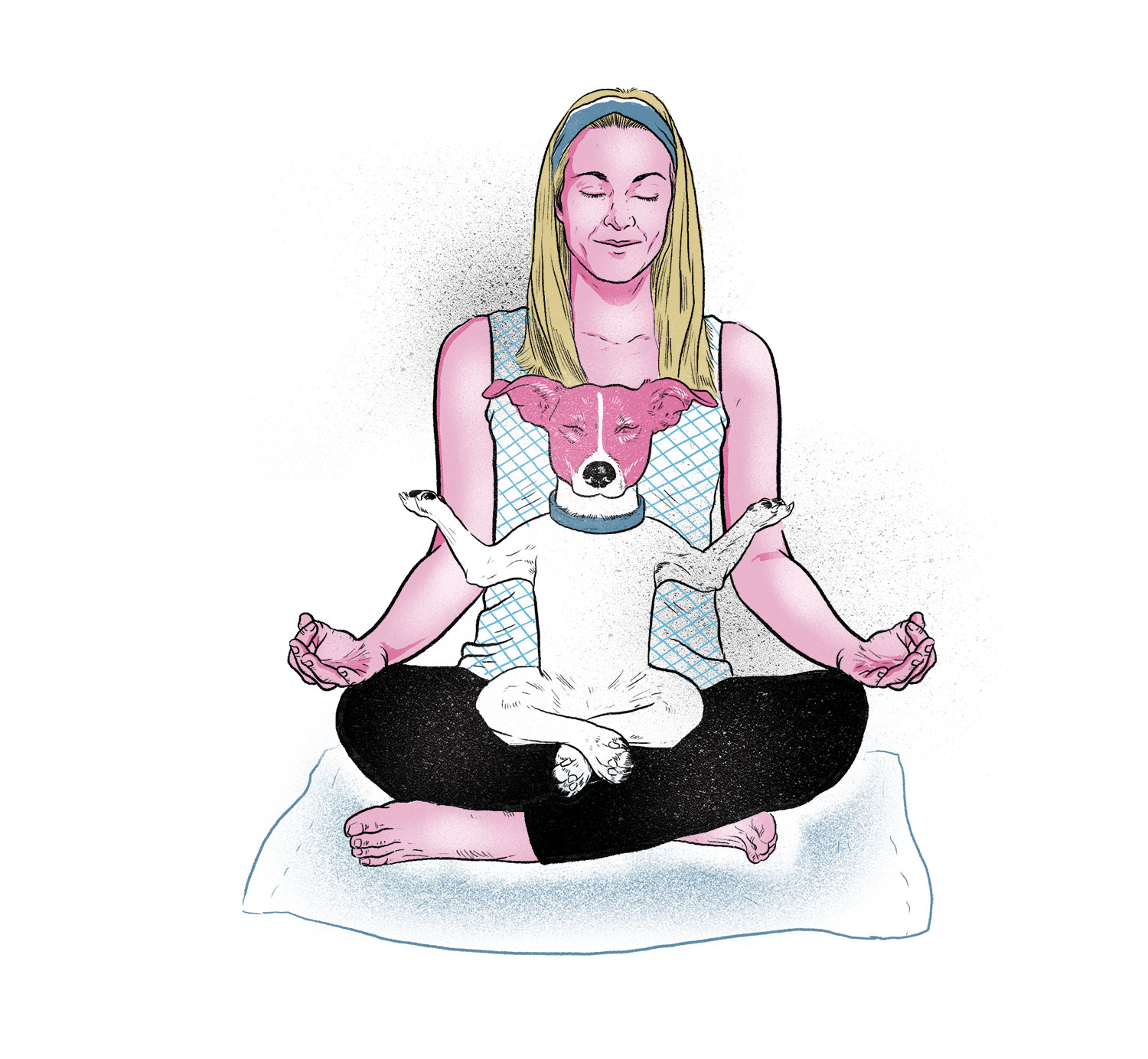
16. Digital Sabbath
If total breaks aren’t an option, try a “Digital Sabbath.” As the name suggests, it’s once a week, should involve the whole family and run perhaps from Saturday evening to Sunday night. The key to stoking enthusiasm for the break is in presenting it properly, says Tiffany Shlain in her book 24/6: The Power Of Unplugging One Day A Week. She doesn’t call it a fast or detox, because of the negative connotations. “Don’t start by saying, ‘We’re all going to give up our phones.’ Start by having everyone write down a list of the things they’re always wishing they had more time for.” This is a way of giving yourself time to do those things, she says.
17. Read More
Implement a daily deep reading habit, especially fiction. The benefits are said to be twofold: to retrain your neural networks to sustain and find satisfaction in unbroken concentration and, in the case of good fiction, to introduce an uncertainty and ambivalence to your thoughts that is not generated by fact-based writing. “The kind of deep reading that a sequence of printed pages promotes is valuable not just for the knowledge we acquire from the author’s words but for the intellectual vibrations those words set off within our own minds,” writes Newport. “In the quiet spaces opened up by the sustained, undistracted reading of a book, or by any other act of contemplation, for that matter, we make our own associations, draw our own inferences and analogies, foster our own ideas.”

18. Dopamine Fast
“Dopamine fasting,” as touted by its Silicon Valley advocates, was mostly mocked when it had its moment in 2020. But it’s not all silliness. The idea is to deprive yourself of dopamine hits (meaning don’t do anything exciting like watching thrilling movies, eating junk food, or going shopping) to break your “addiction” to our hyper-stimulating world. As a result, you’ll find pleasure once again in life’s more meaningful but less buzz-inducing delights, such as natural beauty, good literature, or time with family and friends. There is also a second perhaps more profound benefit: to free yourself from excitement as a driver of action — which is at the core of the problem with digital stimulation. Stop being dependent on excitement and you’ll discover what you’re made of. Interested? The inventor of dopamine fasting offers a guide to having “as little fun as possible” on the Improvement Pill YouTube channel (improvementpill.net).
19. Prioritize
As noted on the productivity podcast precisionchange.com, there is something questionable about the whole “information overload” complaint: if we couldn’t handle vast amounts of information, we’d have a breakdown each time we stepped into wild nature (think of the cacophony of sound, crawling bugs, moving leaves, 125 shades of green, wisps of wind, dipping temperatures, all being taken in simultaneously by your senses). The real trouble is that in the modern world we have defined too many things as worthy of having the power to distract us. In the blurry world of ideas, Peter Drucker’s maxim that if you’re a worker today dealing with large amounts of information, defining your work — staying aware of what genuinely deserves your attention — is the most crucial work you’ll do. If you don’t, your phone is waiting in your pocket to devour your attention.
Advertisement
20. Set If/Then Rules
In study after (peer-reviewed) study, one teachable skill stands out as crucial for habit change: deciding on “if/then” rules in advance, says Kerry Patterson, a former business management professor at BYU and author of Change Anything. Decide what are the “crucial moments” – such as when you find yourself instinctively reaching for your phone when a less-than-fun task presents itself. Formulate a rule, being as specific as possible: “If I find myself reaching for social media, I’ll first spend just five minutes on this job I’m trying to avoid.” True, a strong will makes it more likely you’ll follow the rule. But merely knowing that you need to formulate one in the first place – a skill – makes a huge difference. In one study, it increased the proportion of people who stuck to an exercise plan from 39 percent to 91 percent.
21. Get Proper Breaks
As author and workplace consultant Tony Schwartz has argued, we tend to vastly underestimate the importance of restoration in human life. We operate on a multitude of rhythms, from the seasonal to the circadian (or daily) to the “ultradian” — the peaking and dipping of energy every two hours or so. Each cycle must alternate between exertion and rest if we’re to function well. To concentrate on a task, you need to block out distractions but once that blocking function is worn down by fatigue, you are more likely to act on impulse, to shirk tasks that prove too challenging or to become irritable. Schwartz recommends working in bursts of 90 minutes, followed by half-hour breaks if you can. Note however that it is only activities such as stretching, taking in a dose of nature, or social ones such as chatting with colleagues, that have been shown to deliver energy benefits. “Cognitive breaks, such as checking social media, aren’t really breaks at all; given the load they place on your brain, you might as well have continued working,” Dr. Christian Jarrett a neuroscientist and author explained at the creativity website 99u.

22. Take in Nature
In a world of relentless, aggressive demands on our attention, the American academics Rachel and Stephen Kaplan argue, nature does something different: it exerts “soft fascination.” Soft fascination has two crucial components. First, it’s effortless: you don’t need to “try to focus” on the wind in the trees, or waves breaking on a beach. Second, it’s partial: it absorbs some attention, but leaves some free for reflection, conversation or mind-wandering. The result is what the Kaplans called “cognitive quiet,” in which the muscle of effortful attention — the one you use to concentrate on work — gets to rest, but without the boredom you’d feel if you had nothing to focus on. This helps explain why even just a trip to the local park may seize just enough of your attention to let the rest of your mind relax.
23. Out of Sight
Studies have shown even the presence of a mobile phone on a dinner table is enough to disrupt/degrade a conversation as the gaze of both parties’ turns repeatedly to the device. Truly being with a colleague or customer means picking up countless tiny signals from the eyes and voice and body language and context, and reacting, often unconsciously, to every nuance. What applies to a dining room applies doubly to the sales floor, staff meeting room, or home. “I leave my phone in another room when it is family time so that I am not tempted to constantly check it,” says Sarah Bureau of sbspecs in St. Catharines, ON.
24. Or, Work Like Jefferson
During his eight years as President, Thomas Jefferson made detailed notes on the seasonal availability of various vegetables in the markets of Washington, D.C. During the first week of 1776, with the Declaration of Independence about to be adopted, he began keeping a meticulous record of the temperature, updated many times a day. These odd time-management choices weren’t made because he couldn’t focus, says Joshua Kendall, author of America’s Obsessives: The Compulsive Energy That Built A Nation. Instead, his obsessional habits and industriousness were a self-soothing response to an anxious personality. “A mind always employed is always happy,” Jefferson liked to say. The happiest among the obsessives Kendall profiles are those with self-awareness: they chose to embrace their compulsions, accepting the downsides. It is certainly not a prescription for a peaceable life but it hints at something worth keeping in mind when considering self-improvement advice, such as that offered above: it is essential to understand that any approach must reflect your personality. It is far better that your own psychological quirks are directing your life than the commercial concerns of a software engineer in Silicon Valley. Take control the best you can!